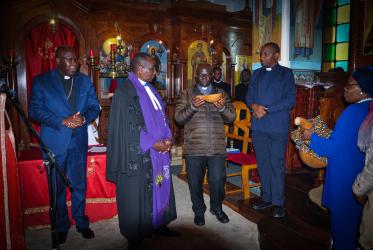* By Fredrick Nzwili
As calm returned to Kenya after a week of tensions and violent protests, religious leaders were stressing actions that could move the country forward, despite a presidential election result dispute that has deeply divided the East African nation.
The country had been tense since 11 August, when the Electoral and Boundaries Commission (IEBC) announced Uhuru Kenyatta, the incumbent president, the winner. The main opposition has since rejected the results, with Raila Odinga, the 72-year-old National Super Alliance candidate, pledging to use all means to overturn what he deems a fraudulent result.
Religious leaders urged politicians to seek answers in the courts. Odinga on 16 August announced he would challenge the result in the Supreme Court, calming an anxious country, which feared opposition action may ignite further chaos.
On 15 August, Anglican bishops added their voice in urging politicians to refer their concerns to judicial authorities to allow orderly and sober resolution of the disputes. They had also called on the government to roll out a healing and reconciliation process following the deaths and divisions. In addition, they called for an audit of the process.
“As a country, we must take seriously (the post-election) audit, review and reforms needed to take the country forward. This is the only way Kenya can normalise so that election times do not become a season of killings, tensions and near shut-down of the economy,” said Archbishop Jackson Ole Sapit at a news conference in Nairobi.
Kenyatta, 55 years old, has been cordial, extending an olive branch to the opposition and calling them to join in unity to build Kenya.
“I appeal to all those who have rejected the results to come to the realisation that we are all Kenyans. I extend a hand of peace and friendship to them,” Kenyatta said on 14 August. “The aggrieved should realise they do not need permission to hold peaceful protests. The police are ready to offer protection during these protests.”
The move had religious leaders welcoming the president’s reconciliatory tone.
Ahead of the polls, the leaders had campaigned and prayed for a peaceful voting and post-election period. The clerics had been accompanying the people, while stressing that this is the only country they have as their home. They had urged politicians to watch their language as to not provoke their supporters or those of their opponents.
On voting day, millions of Kenyans braved the morning chill, rains, heat and long queue and turned up to vote, with the process being described as peaceful and fair. Church leaders praised the large turnout as confirmation of a strong patriotism, unity and love for peace. Kenyans were electing a president, senators, Members of Parliament, women representative and civic leaders.
“We applaud the people of Kenya for conducting yourselves with calmness and sobriety during the electoral process. This is true patriotism,” said Roman Catholic Bishop Philip Anyolo, chairman of the Kenya Conference of Catholic Bishops.
But violence sparked after the announcement of the presidential results, casting a dark shadow on what had been described one of the country’s most peaceful votes. At least 24 people are believed to have died, including a 9-year-old girl hit by stray bullet in Mathare slums, according to the Kenya National Commission on Human Rights.
Church leaders cautioned that moving towards violence was not the way to go.
“You don’t get justice by being violent. We want peace and can get justice by being sober and stating our case,” said Bishop Tim Wambunya, convener of the Great Maseno Region of Anglican Church of Kenya Bishops’ Summit.
A series of election observers and western officials passed the elections as credible and urged those who have lost to accept the results.
Kenyatta had garnered more than 8.2 million votes while Odinga got about 6.8 million. That means Kenyatta won with a 9 percent margin, but Odinga alleged hackers targeted the electoral commission computers. The electoral commission has denied there was any computer hacking.
“These people belong to us. IEBC needs to answer the questions they are asking. The commission needs to give proof that the computers were not hacked. We have heard similar allegations in America, and unless this is proven, some people will continue to believe this is true,” said Wambunya.
A local election observer group, Election Observation Group, which deployed 8,300 observers and conducted parallel tallying operations, determined that Kenyatta had won with the same margin given by IEBC.
Similar claims by Odinga in 2007 ignited deadly post-election violence that left more than 1,000 people dead and more than 600,000 displaced from their homes. With the churches moving to host the displaced, the violence ended with formation of a grand coalition government.
Religious leaders have also taken stock of why post-election violence follows Kenya’s polls.
According to retired Roman Catholic Bishop Alfred Rotich of the Military Ordinariate, the stress that builds during lengthy election campaign periods is never vented.
“There should be post-traumatic stress relief activities to accompany the politicians and a debriefing by religious leaders before they take up their offices. They belong to us (religious) and each denomination should bring theirs together for this purpose,” said Rotich.
Some observers say negative ethnicity, perceived marginalisation of some communities and poverty, are some of the causes of Kenya’s recurrent post–election violence.
* Fredrick Nzwili is an independent journalist based in Nairobi, Kenya.
Kenya churches seek peace in contested general elections
Ahead of Kenya elections, concerns about peace emerge, WCC press release 3 August, 2017





